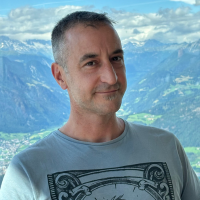WORKSHOP 4
BEYOND BORDERS: TRANSMETHODOLOGY AS RHIZOMATIC BECOMING
Have you ever felt constrained by the rigid boxes of traditional qualitative methodology? What happens when a research begins to transgress its methodological borders? Do you seek more creative, relational, and critical ways to conduct your research in the social sciences?
This workshop offers a hands-on immersion into the frame of transmethodologies (TMs) – a space of onto-epistemological provocation that challenges the established canons of qualitative research. Instead of being yet another method, TMs encourage a critical sensibility towards moving beyond methodological orthodoxies and rulebooks to think about the agency of theories and methods. We will play with some of the main ideas that compose the theoretical mosaic of TMs, including Deleuze and Guattari's concepts of difference and rhizomatic becoming, Barad's intra-actions and onto-epistemologies, non-representational inquiry, and decolonial border thinking.
In this workshop-laboratory, we will experiment with how a TM framework might become useful in your inquiries. Working with the crucial distinction between borders as political performances that separate and exclude, and boundaries as fluid sites of potentiality and becoming, we will engage in embodied, experiential activities to deterritorialize our research practices and assumptions. We will collectively map concerns and navigate the productive tension between methodological borders and epistemological boundaries. The aim is to collaboratively weave tools, affects, and provocations for a transmethodological research practice: one that treats methodological constraints not as rigid borders to be defended, but as agentic boundaries to engage and transcend. The result, perhaps, will be embracing indeterminacy, permeability, and care to imagine inquiries that explore how matter comes to matter and what this mattering does.
Join us to rethink your methodological practice and transform your research from a scripted procedure into a dynamic conversation about methodological mattering.
Reccommended reading:
Gemignani, M. (2025). Transmethodologies: A theoretical introduction and its application in the field of family transnationality. Qualitative Research. http://dx.doi.org/10.1177/14687941251341983
WORKSHOP FACILITATORS

Prof. Marco Gemignani
I am Associate Professor in the Psychology Department at Universidad Loyola (Seville, Spain), where I teach qualitative research. As a clinical community psychologist, I specialize in migration and cultural studies, lately with a focus on family transnationality. I was formerly a tenured professor in the Psychology Dept. at Duquesne University (Pittsburgh, PA, USA), where I founded and directed the “Psychological Services for Spanish Speakers.” Moved by a heartfelt desire to advance critical qualitative methodologies in the social sciences, I serve on the editorial or scientific board of several journals, institutions, and associations dedicated to cultural studies and to qualitative research. I was a former president of the Society for Qualitative Inquiry in Psychology (APA Div. 5), and I am now president-elect of the Association of European Qualitative Researchers in Psychology.

João Henrique Borges Bento
I am a Research Assistant in the Department of Psychology at Universidad Loyola Andalucía and a PhD student in Inclusive and Sustainable Development. I hold a master’s degree in Social and Community Intervention Psychology from the Universidad de Sevilla, and I am currently completing another master’s in International Migration, Health, and Wellbeing. My research focuses on migration, transnational families, feminism, gender, and social justice, using qualitative methodologies.

